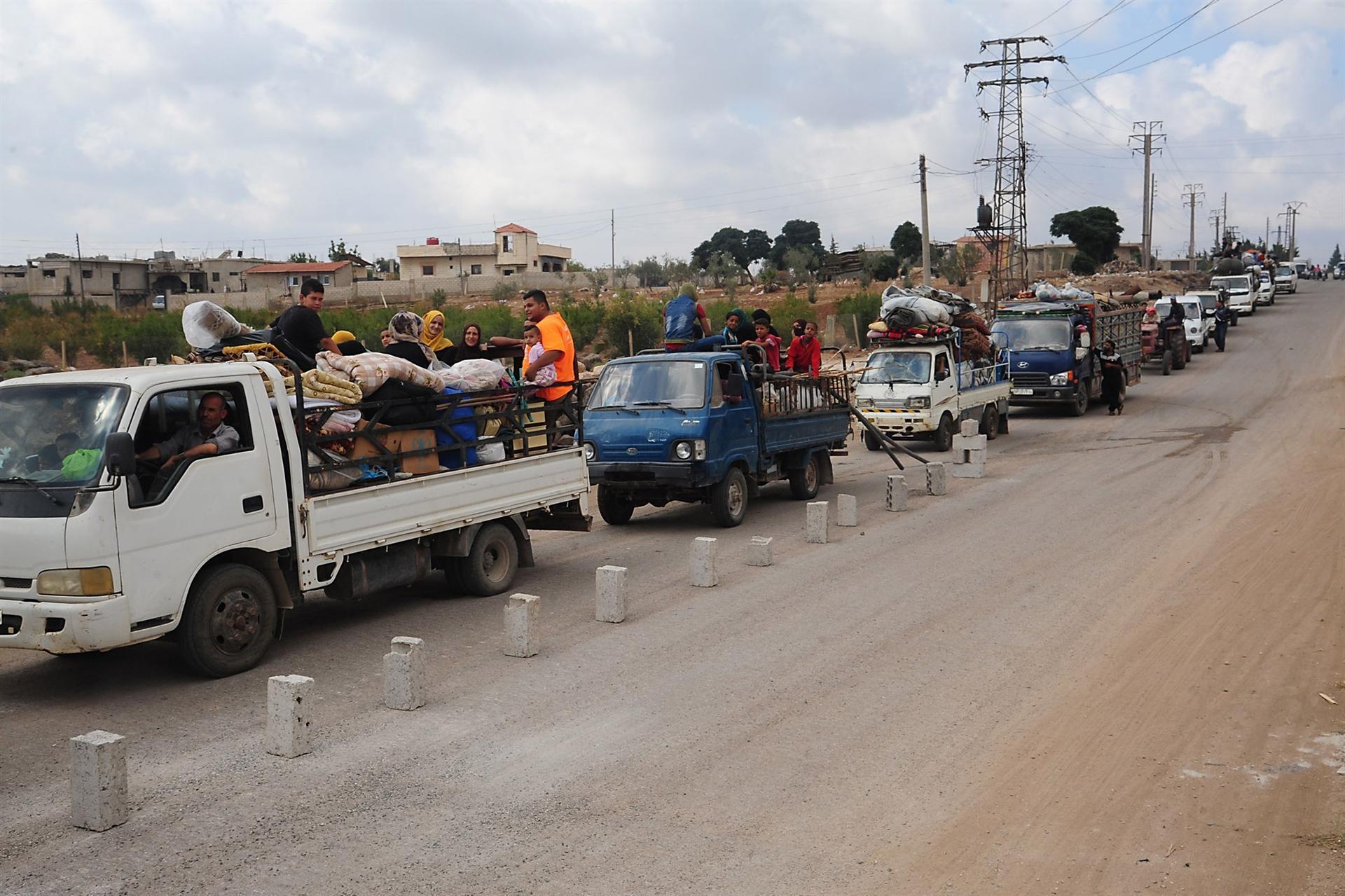
This handout picture released by the official Syrian Arab News Agency (SANA) on July 29, 2018, shows displaced Syirans returning to their villages in the province of Daraa. AFP PHOTO / SANA
Officials from Turkey, Russia and Iran began talks on July 30 in Russia’s Sochi city ahead of a 10th round of Syria peace talks in Kazakhstan’s capital Astana, slated for July 31.
The Astana talks will address the latest situation in de-escalation zones in Syria’s Idlib, the return of refugees, the release of prisoners and the formation of a committee that will rewrite Syria’s constitution.
For Turkey’s part, Ankara is emphasizing on the preservation of rules of engagement drawn up as per the Astana agreement, which is preventing any military offensive by the Syrian regime on the rebel-hold Idlib province.
President Recep Tayyip Erdoğan, in an interview on the weekend, said the main agenda of the gathering in Sochi would be “stopping the clashes, the beginning of constitutional commission works, holding elections and vitalizing the political transition process.”
Elaborating on the meeting with his Russian counterpart Vladimir Putin in the BRICS summit on July 26, Erdoğan said Russia and Turkey have discussed the issue on the northwestern province of Idlib, where Turkey has established 12 observation points.
“Our soldiers are present there. It is impossible for us to accept any attack from the Syrian regime. I have discussed it with Mr. Putin. We have agreed on that,” he said.
“If our Arab friends toward the north especially are to have a similar experience to that in Aleppo, it would be a serious problem for us,” Erdoğan added.
Summit with Germany, Russia, France in Turkey
Erdoğan said Turkey is seeking to hold a summit in Istanbul with France, Germany and Russia on Sept. 7 to discuss regional issues including the Syrian conflict. “We will discuss what we can do in the region together,” he stated. He gave no further details on issues on his agenda, but said Turkey will continue dialogue with Russia, “outside of these four countries.”
In April, Erdoğan held a summit with Putin and Iranian counterpart Hassan Rouhani in Ankara. The three leaders are due to meet again in the near future in Tehran, he said, without giving an exact date.
One of the critical topics in a phone call between Erdoğan and Putin on July 14 was the issue of Idlib. The phone call came after the Syrian government raised the flag on July 12 over areas of Daraa in southwestern Syria that were in rebel hands for years.
Pro-regime armed groups in Syria recently evacuated from two villages, Kafraya and Fuaa, in Idlib province, within the framework of an agreement. The villages were the two last places hosting pro-regime groups which were under siege for a long time by jihadist anti-regime groups. Idlib now has huge rebel presence, raising concerns for any possible attack by the regime, which could trigger a huge migration wave toward Turkey.
Forming constitutional committee ‘atop agenda’
The process of launching intra-Syrian negotiations based on U.N. Security Council Resolution 2254 and further steps to launch the work of the Constitutional Committee are among the core issues at the Sochi meetings, along with the assessment of the current state of de-escalation zones.
The U.N. Security Council last week called on Damascus to work with U.N. Special Envoy for Syria Staffan de Mistura on the creation of a constitutional committee.
The formation of the committee, which will rewrite the Syrian constitution, was agreed at the Syrian National Dialogue Congress on Jan. 30. The Syrian government has submitted a list of names to the U.N. as candidates for to the constitutional committee. The Syrian Negotiation Commission has also submitted a list of 50 candidates to represent the Syrian opposition in the committee. It is up to de Mistura to decide whom to pick and the committee is yet to be formed.
The return of refugees
The Russian government has announced that Syrian refugees could soon return to their homeland. Russia this month presented the United States proposals for the return of refugees from Jordan, Turkey, Lebanon and Egypt that would involve international financial support. New legislation, known as law number 10, would allow the Syrian government to confiscate the property of refugees and displaced Syrians unless they register ownership with the authorities in 30 days. The return of refugees is among the topics to be discussed at the meeting in Sochi.
The Astana process has set up a working group on exchanging detainees and bodies of those killed, and the group held its regular meeting in Ankara recently.